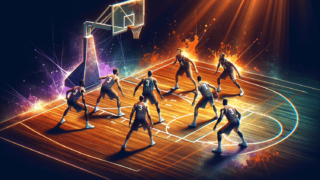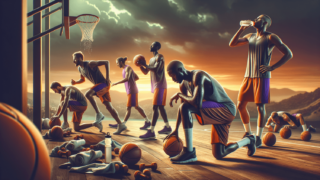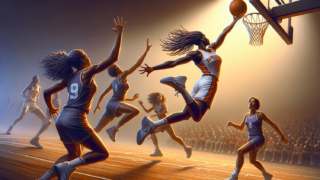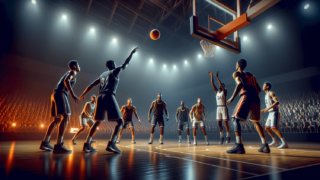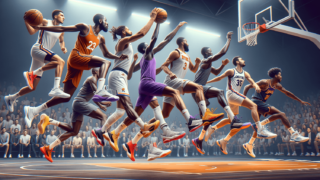
How to Become a Better Team Player in Basketball?
Written by: Basketball Universe
Last updated:

Basketball, a game that thrives on teamwork and collaboration, is much more than just scoring points and screaming victory. In fact, the true essence of this sport lies in unlocking one’s potential as a team player. But, how does one transform into an invaluable asset on the court? Welcome to our blog post on “How to Become a Better Team Player in Basketball?. Dive into the world of alley-oop passes, tenacious defense, and selfless strategies that not only elevate your prowess but also empower your teammates in their pursuit of excellence. Let’s embark on this exciting journey together, blending fun and professionalism, while unraveling the secrets behind creating an unparalleled synergy on the hardwood!
How to Become a Better Team Player in Basketball?
To become a better team player in basketball, focus on enhancing your communication skills, embracing your role within the team, working on your basketball fundamentals, staying mentally and physically prepared, and displaying a positive attitude. Encourage your teammates, be willing to share the ball by utilizing effective passing, offer consistent defensive support, and learn when to lead or follow on the court. By integrating these qualities, you will effectively improve both your personal performance and your team’s overall success.
Mastering the Art of Communication
Effective communication is the backbone of any successful basketball team. As a player looking to improve your teamwork skills, make sure you are not only able to effectively communicate with your fellow teammates but also understand their cues and signals.
Verbal Communication
On-the-court communication can be as simple as calling out screens, directing your teammates through defensive strategies, or shouting orders for specific plays. Being vocal about your intentions, providing constructive criticism, and praising others’ accomplishments can foster team spirit, build confidence, and enhance overall gameplay.
Non-verbal Communication
Eye contact, body language, and using hand signals can help a team execute plays efficiently, without alerting opponents or losing focus. Learning, practicing, and mastering pre-determined hand signs can save crucial seconds during high-pressure moments, while also streamlining court communication.
Embracing Your Role on the Team
An effective basketball team is like a well-oiled machine with each player contributing specific skills to the overall performance. By accepting and embracing your role, you can focus on maximizing your strengths and developing the aspects of your game that benefit the team the most.
Identify Your Strengths and Weaknesses
Knowing your strengths and weaknesses enables you to focus on areas that need improvement and continue honing your natural abilities. Create specific, measurable, and realistic goals that guide your improvement process.
Adapt to Different Scenarios
A great team player is flexible and can adjust their roles according to the situation on the court. Familiarize yourself with various positions, learn new strategies, and always be prepared to step up or switch positions when the team needs it.
Sharpen Your Basketball Fundamentals
Becoming a better team player requires a strong foundation in the game’s fundamental skills. Continuously working on your shooting, ball-handling, passing, defense, and court awareness are essential steps towards individual and team success.
Shooting
Developing a reliable and accurate shooting ability opens up the floor for your teammates by forcing the opposing team to play tighter defense. Work on your shooting form, improve shot release, and practice consistency with different shot types.
Ball-handling
Handling the ball with confidence and skill enables you to make better decisions on the court, and leaves openings for teammates to score. Devote time to enhancing your dribbling techniques, control, and speed to keep defenders on their toes.
Passing
Mastering various types of passes helps the team maintain possession and creates scoring opportunities. Learn and practice chest passes, bounce passes, overhead passes, and even some flashy no-look passes in your training sessions.
Defense
Strong team defense is crucial to victory, so focusing on improving your individual skills is key. Work on your footwork, positional awareness, and contesting shots effectively to help you stay ahead of your opponents.
Court Awareness
Understanding how to read the game and anticipating your opponent’s moves are vital traits of a solid basketball player. Focus on your in-game decision-making, study your opponents, and develop your basketball IQ to stay two steps ahead of the competition.
Maintaining Physical and Mental Preparedness
Being a better team player involves not only improving your on-court skills but also ensuring that you are physically and mentally prepared for the challenges ahead.
Physical Fitness
Building up your stamina, strength, and flexibility can significantly improve your on-court performance. Incorporating a fitness regimen into your training routine and staying consistent will provide noticeable results, positively impacting your overall game.
Mental Preparedness
Mental strength plays a major role in elevating your game to the next level. Learn strategies to deal with pressure, remain confident in the face of failure, and develop a positive attitude to motivate yourself and your teammates.
Adopting a Positive Attitude and Sustaining Team Spirit
A winning basketball team is built on camaraderie and a positive attitude. A strong team spirit and mutual encouragement can often be the difference between a good and a great team.
Offer Encouragement and Support
Boost your teammates’ morale by offering words of encouragement, high-fives, or sideline cheers during both practice and games. Acknowledging their hard work and highlighting successes can create a supportive team environment in which everyone feels valued.
Embrace Constructive Criticism
Being open to feedback and willing to learn from mistakes fosters self-improvement and personal growth as a player. Approach criticism positively, see it as a learning opportunity, and integrate it into your overall development.
Lead by Example
Exhibit exemplary behavior on and off the court by always giving 100% effort – this motivates others to do the same. Focus on teamwork, respect, and cooperation to set the tone for the entire team and promote a positive environment in which everyone thrives.
Conclusion
The journey towards becoming a better team player in basketball is ongoing, but with continuous effort and improvement, these skills can become a natural part of your game. Implementing the tips and strategies outlined above, embracing your role, and fostering team spirit will not only make you an indispensable team player but ultimately elevate the overall success of your team.
Continuously Building Team Chemistry
Team chemistry is essential for a successful basketball team, and continuously working to build and strengthen relationships with your teammates can reap dividends on the court. Players who genuinely understand and trust each other’s abilities often demonstrate improved synchronicity and efficiency on the court.
Participate in Team Building Activities
Take part in team building activities outside of practice to develop stronger bonds with your teammates. This could include recreational sports, outings, or simply hanging out together. Off-court interactions can improve players’ rapport and communication, leading to better on-court performance.
Respect and Appreciate Your Coach
Coaches play a crucial role in the growth and success of basketball players. By respecting and supporting their decisions, you set a positive example for others and implicitly foster a culture of trust, cooperation, and improvement within the team. Furthermore, be open to feedback and embrace the learning opportunities that come with it.
Developing a Growth Mindset
Having a growth mindset means that you believe your abilities can be developed and improved over time. This perspective can lead to more significant personal and team-wide improvements, as players who are committed to growth are more likely to value learning, feedback, and hard work.
Learn from Your Mistakes and Failures
Allow yourself to see mistakes and failures as opportunities for learning and growth. Reflect on moments where you struggled, analyze what went wrong and understand how to move forward as a better player. Embracing this mindset will help you approach setbacks constructively and adapt to any challenge thrown at you.
Stay Motivated and Committed
Commitment to self-improvement and team success is essential when aiming to become a better team player. Establish and pursue clear individual and team goals, hold yourself accountable, and invest time and energy into consistently working on your skills. This can inspire others to do the same and boost the team’s performance.
Expanding Your Basketball Knowledge
Becoming a well-rounded player and an effective team contributor entails constantly expanding your basketball knowledge. Deepening your understanding of the game allows you to make smarter, faster decisions on the court, and better supports your teammates.
Study the Game
Watch basketball games at all levels, from youth to professional play, and analyze tactics, strategies, and player roles. By studying different teams and styles of play, you’ll gain a broader understanding of the game that can help you adapt and respond effectively in various situations.
Learn from the Greats
Modeling your game after successful players in your position or those with a similar playing style can offer valuable insights and inspiration. Analyze clips of their best plays, identify techniques and moves they employ, and work to incorporate those into your own skillset.
Stay Updated on Basketball Trends
Just like any other sport, basketball is continuously evolving. Stay informed about the latest trends, rule changes, coaching techniques, and advances in technology, as they can have a direct impact on how the game is played and your role within the team. This knowledge can be invaluable in dealing with challenges on the court and supporting your teammates in achieving their goals.
Frequently Asked Questions
Here’s a handy FAQ section with answers to some of the most common questions related to becoming a better team player in basketball. We’ve compiled these questions and provided concise, helpful responses to address any uncertainties and supplement the information in the blog post.
1. How often should I practice my basketball skills to become a better team player?
Consistent practice is essential for improving your skills, and generally, it’s good to aim for at least 3-4 basketball sessions per week. This should include a mix of team practices, individual skill work, physical conditioning, and watching film or studying the game.
2. How can I improve my communication skills on the basketball court?
To improve your communication skills, actively engage with your teammates on and off the court, practice using verbal and non-verbal signals, and be vocal during games and practices. Over time, you’ll become more comfortable and effective in conveying information.
3. What if I’m not a natural leader? Can I still be a good team player?
Yes, absolutely! Not everyone has to be a vocal leader; being a good team player can also mean setting a positive example through hard work, a supportive attitude, and solid performance on the court. Just ensure you contribute positively and adopt good team values.
4. How can a team build stronger chemistry?
Team chemistry can be built through consistent communication, team-building activities, respecting one another, and spending time together off the court. Building strong relationships and trust among teammates generally leads to better performance and camaraderie.
5. How important is physical fitness in being a better basketball team player?
Physical fitness is crucial, as it allows you to keep up with the pace of the game and maintain good energy levels throughout. A well-conditioned player is less likely to make mistakes due to fatigue and can contribute more effectively to the team’s success.
6. What can I do to develop a growth mindset as a basketball player?
To develop a growth mindset, embrace the idea that your abilities can improve over time. Focus on learning from mistakes, accepting feedback, setting realistic goals, and maintaining motivation and commitment to self-improvement and team success.
7. Can being a better team player increase my chances of getting recruited to play college basketball?
Yes, college coaches often prioritize players who demonstrate good teamwork, dedication, and selflessness. Being a better team player not only enhances your skillset but also increases your desirability as an athlete in competitive basketball environments.
8. How can I identify my strengths and weaknesses as a basketball player?
Identifying strengths and weaknesses can be achieved through self-analysis, requesting feedback from coaches and teammates, and evaluating game film. Reflect on your performance in various game situations and track your progress over time to get a clearer understanding of where you excel and where you need improvement.
9. How can I help a teammate who’s struggling to contribute to the team’s success?
Offer constructive feedback, encouragement, and support to help your struggling teammate regain confidence. Additionally, provide guidance on specific skills they could improve, lead by example through hard work, and demonstrate patience as they work towards improving their contribution.
10. Can I be a better team player if I am not very skilled at basketball?
Yes, being a good team player is not solely about skill level. It also involves communication, a positive attitude, dedication, strong work ethic, and the ability to support and uplift teammates. Focus on continuous self-improvement and consistently contribute to the team’s overall betterment for best results.
Featured Posts
- No pillar pages found.
